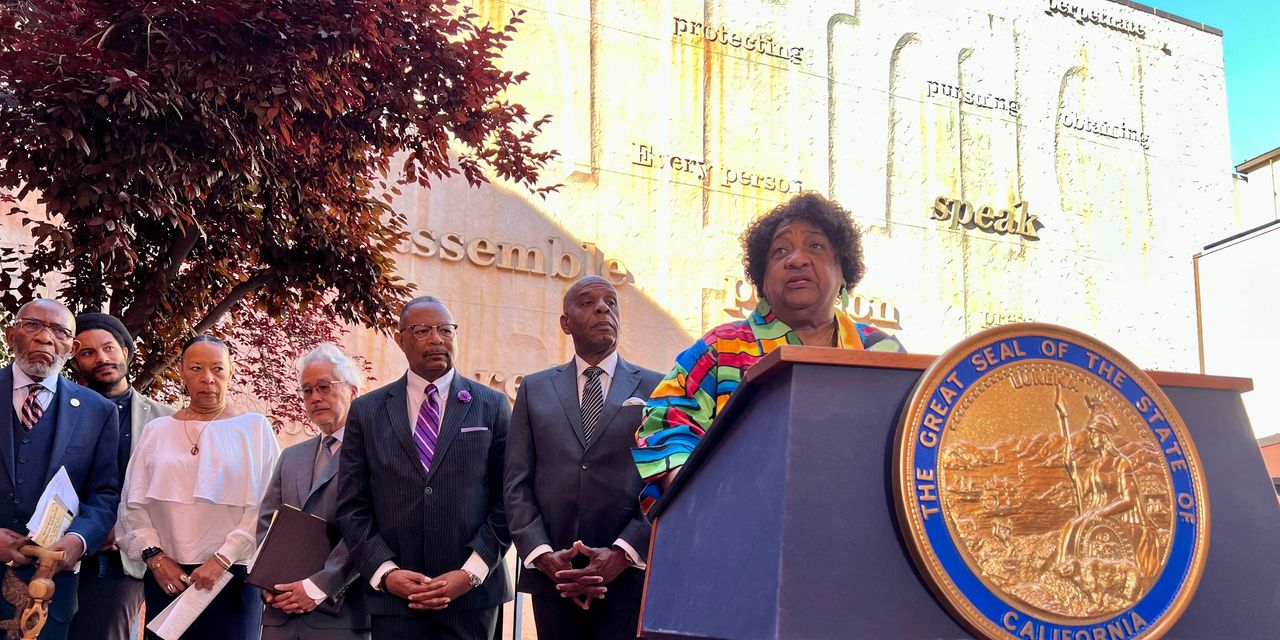A couple of hundred people chanted “Reparations now!” in a packed auditorium at the California Secretary of State headquarters in Sacramento on Thursday as the first-in-the-nation state-level reparations task force unveiled its final report and recommendations.
Secretary of State Shirley Weber, who wrote the law that tasked the nine-member group with studying reparations and presenting its report to state lawmakers, “deserves a Nobel Peace Prize,” one person said during the public-comment period.
What Weber received Thursday — during an alternately celebratory and serious, almost somber day filled with the weight of the historic occasion — was a standing ovation and the gratitude of the public, task-force members and state officials. When it was her turn to speak, Weber said that what comes next is a “battle” to make the recommendations a reality.
She urged the public to read the report in preparation for that fight, alluding to the backlash that the reparations effort has already received. “The document answers every question,” she said.
The report, more than 1,000 pages long, is a culmination of two years of work and extensive research by the task force with the help of the state Department of Justice. Over a total of 16 meetings, many of which were two days long, the task force heard from many experts and members of the public while navigating a fraught political climate.
“After being denied 40 acres and a mule … our time is now,” another commenter said.
State Sen. Steven Bradford, a Democrat from Los Angeles, is one of two task-force members — the other is Assemblyman Reggie Jones-Sawyer — who will take the lead in trying to turn the recommendations into policy.
“We know it’s a challenge,” Bradford said during a news conference before the meeting. While reflecting on his membership on the panel during the meeting, he said that in his 25 years as an elected official, “this will be my most impactful work.”
Besides recommending monetary compensation potentially worth billions of dollars for descendants of enslaved people, the task force has proposed an array of policy changes that would benefit Black Californians, including allowing incarcerated people to vote and repealing Prop. 209, which outlawed affirmative action in the state.
Many of the task-force members referred to the U.S. Supreme Court decision Thursday that colleges cannot use race in admission decisions, calling it ironic that the ruling was handed down the same day that California took a historic step toward reparations.
Read more: How college admissions will change in America after the Supreme Court knocked down affirmative action
See also: The Supreme Court knocked down affirmative action in colleges — and companies could feel the effects too
“I would encourage the Supreme Court to read the … report, and to understand that the legacy of enslavement and ongoing harms are with us to this very day,” task-force member Cheryl Grills said during the news conference before the hearing.
One of the the task force’s biggest recommendations is the creation of a new state agency modeled after the Freedmen’s Bureau, which was established to help freed enslaved people after the Civil War. Besides handling claims for reparations, the new Freedmen Affairs Agency would also have oversight power to try to ensure other existing agencies provide racially equitable services.
The task force was established as a result of a bill written by Weber when she was a state assemblywoman and signed into law by Gov. Gavin Newsom in 2020. The task force, which first convened in June 2021, released its preliminary report last year. Among other things, the report looked at how although California was not officially a slave state, its policies helped support slavery and furthered discrimination against Black Americans.
As the task force disbands, its members both inside and outside the legislature intend to continue their work.
“We can’t step away,” Lisa Holder, a civil-rights attorney and president of the nonprofit Equal Justice Society, told MarketWatch. “It’s important to continue the leadership” on reparations that has been created by the task force, she said.
Read next: Will there be enough public support for reparations?
Read the full article here


